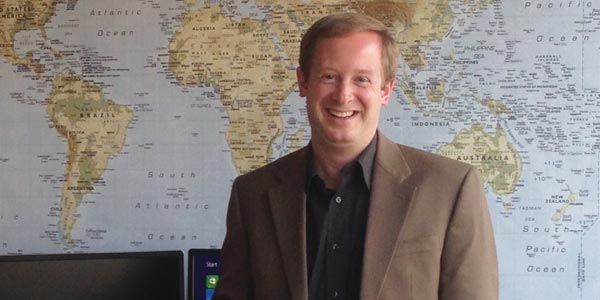Alumni Profile
Mentor See, Mentor Do
by Joanie Eppinga
Ryan Williams ’95, M.A., M.B.A., Ph.D., had three degrees, four languages, and five job offers when he decided to come home.
Williams had been working internationally in mergers and acquisitions, and four of his offers in the United States were in the private sector. “I made up my mind to take a jump,” he says. “I chose the fifth option: working in international education at Syracuse.”
Now assistant dean for Washington programs at Syracuse University, Williams deeply enjoys teaching and mentoring students in a semester-away program in Washington, D.C. “I teach foreign policy decision making,” he says, “and supervise internships. The mentoring I do creates a bridge between the academic world and the practical world of international affairs.”
Williams notes that he wants students to leave the program able to think and write well—not as much for academic purposes as to be able to develop strong, analytical policy memos. “I want them to develop the professional skills they need to get a job,” Williams says. “My greatest challenge is also my greatest reward: figuring out how to help students succeed.”
Students encounter one tool for success when Williams takes them to the National Security Council, the main policy-making structure for presidential administrations. There, students are briefed by a staffer who also briefs the POTUS. It’s a heady experience. Students draw on it later in the semester, when they simulate being members of the council and making policy recommendations to superiors about changing policy in a particular part of the world. In this way, students begin to understand important connections among various countries.
“I want them to realize that the decisions they make in the course of their careers are consequential,” says Williams, “and that they need to better understand the world before they can make those decisions in a meaningful way.”
Williams introduces that broader vision partly through a class he teaches that takes students to embassies, think tanks, and NGOs, where they talk about issues of international importance. “I like to introduce students to worldviews that may be outside their comfort zone,” says Williams. “I hope every time I do that, I’m making a difference.”
Williams learned about making that kind of difference in college. “Nazareth offered me that global perspective I’m trying to instill in my own students,” he says.
“When I arrived at Nazareth,” Williams says, “I didn’t know what I was going to study.” The answer became apparent after he met William Hopkins, Ph.D., an energetic professor. Whatever that guy teaches, I want to take his class, Williams thought. Hopkins taught German and convinced Williams to major in the language. “I stuck with him and ended up closely following his advice,” says Williams, which included earning a Fulbright to teach English in Germany.
Asked whether he is having the kind of impact on his students that Hopkins had on him, Williams laughs. “You’d have to ask my students! What I do know is that I’m very fortunate.” It seems likely that his students are, too.
Joanie Eppinga is a freelance writer and editor in Spokane, Washington.

Ryan Williams '95, M.A., M.B.A., Ph.D., serves as assistant dean for Washington, D.C., programs at Syracuse University.
Since Ryan Williams' Fulbright experience, more than 40 Nazareth students have won the prestigious award.
For more alumni profiles, visit alumni.naz.edu.